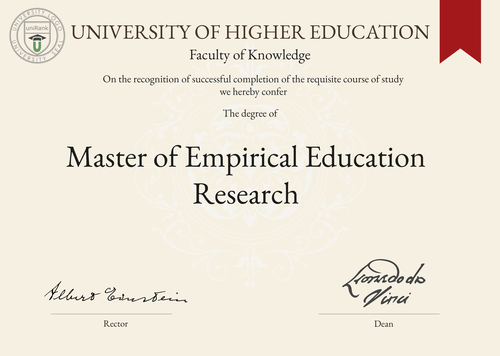
Master of Empirical Education Research (M.E.E.R.)
Guide to Master of Empirical Education Research Program/Course/Degree
Master of Empirical Education Research (M.E.E.R.)

Program Name:
Master of Empirical Education ResearchProgram or Degree abbreviation:
M.E.E.R.Duration range:
Varies by country and university, typically 1-2 yearsTuition range:
Varies by country and university, typically $10,000-$30,000 per yearOverview:
The Master of Empirical Education Research program is designed to provide students with advanced knowledge and skills in conducting empirical research in the field of education. This program focuses on equipping students with the necessary tools to design, implement and analyze educational research studies.Curriculum Overview by year:
- Year 1: Introduction to Education Research, Research Design and Methodology, Statistical Analysis in Education Research - Year 2: Advanced Topics in Education Research, Data Collection and Analysis, Thesis or Capstone ProjectKey Components:
- Research design and methodology - Statistical analysis techniques - Data collection and analysis - Thesis or Capstone projectCareer Prospects:
Graduates of the Master of Empirical Education Research program can pursue various career paths in the field of education research. They can work as research analysts, data scientists, policy analysts, or research consultants in educational institutions, government agencies, non-profit organizations, or research firms.Salary Expectations:
Salary expectations for graduates of the Master of Empirical Education Research program can vary depending on factors such as location, experience and job position. On average, graduates can expect to earn a salary ranging from $50,000 to $80,000 per year. For a more accurate understanding of salary expectations, you can utilize the Job Sites Search Engine, from our sister site jobRank, which searches over 4,600 job sites worldwide. Make sure to specify not only the job title but also the country you are interested in.Conclusions:
It is important to note that the duration, tuition fees, curriculum, key components, career prospects and salary expectations of the Master of Empirical Education Research program can vary depending on the chosen country or location of study, as well as the chosen university. Prospective students are advised to research and compare different programs and universities to find the best fit for their academic and career goals. Visitors interested in pursuing a Master of Empirical Education Research degree can use the uniRank World Universities Search Engine to search for universities offering this specific degree anywhere in the world. This search engine provides comprehensive information on universities, programs and rankings to help students make informed decisions about their education.World Universities Search Engine
search for Master of Empirical Education Research (M.E.E.R.) and add the Location (country, state etc.) or specific University you are interested in studying at.
Query examples:
- Master of Empirical Education Research (M.E.E.R.) United States
- Master of Empirical Education Research (M.E.E.R.) United Kingdom online
- Master of Empirical Education Research (M.E.E.R.) Australia international students
- Master of Empirical Education Research (M.E.E.R.) University of California
- Master of Empirical Education Research (M.E.E.R.) University of London tuition fees
- Master of Empirical Education Research (M.E.E.R.) University of Sydney scholarships
Share Program/Course
Interesting? Share this program/course/degree info with your friends now.